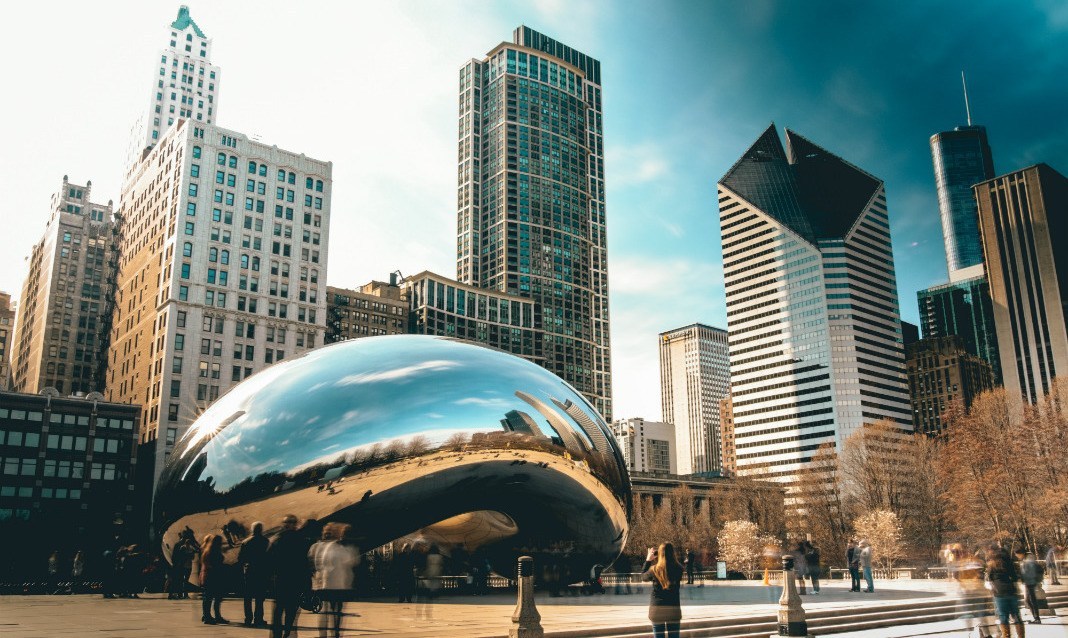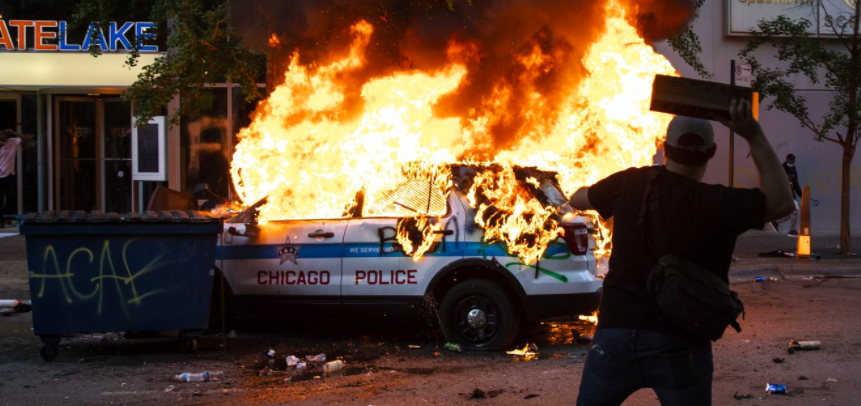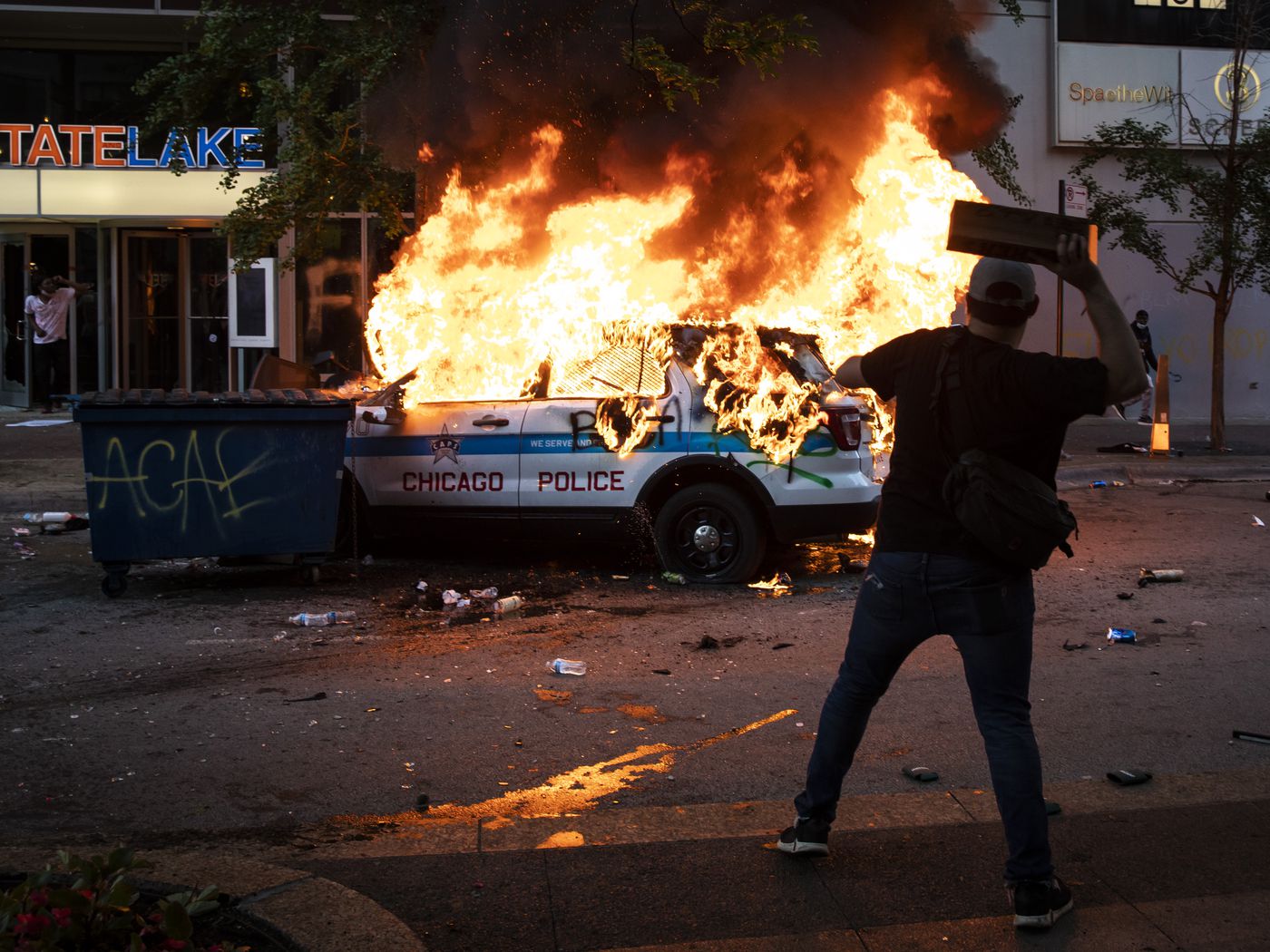
You may not know this, but it is not only that the Daily Stormer is recommending that people leave the cities – people are already naturally leaving the cities.
They understand why protesters and rioters have poured onto the streets of downtown, and some acknowledge that crime is worse in other parts of Chicago. Some also agree with protesters that something systemic needs to be changed.
But they don’t want to wait it out here in the city, fearful of stepping outside at night and hoping for things to maybe get better.
They want out.
“Not to make it all about us; the whole world is suffering,” said Amber, a 30-year-old nurse who lives in River North. “This is a minute factor in all of that, and we totally realize that. We are very lucky to have what we do have.
“But I do think that I’ve never had to think about my own safety in this way before.”
Incidents of widespread looting and soaring homicide figures in Chicago have made national news during an already tumultuous year. As a result, some say residents in affluent neighborhoods downtown, and on the North Side, no longer feel safe in the city’s epicenter and are looking to move away. Aldermen say they see their constituents leaving the city, and it’s a concern echoed by some real estate agents and the head of a sizable property management firm.
It’s still too soon to get an accurate measure of an actual shift in population, and such a change could be driven by a number of factors — from restless residents looking for more spacious homes in the suburbs due to COVID-19, to remote work allowing more employees to live anywhere they please.
But, for some Chicagoans, the chaotic bouts of destruction in recent months have proven to be the last straw.
The day after looting broke out two weeks ago, a Tribune columnist strolled through Gold Coast and Streeterville. Residents of the swanky Near North Side told him they’d be moving “as soon as we can get out.” Others expressed fear of returning downtown in the future.
Rafael Murillo, a licensed real estate broker at Compass whose primary market is downtown high-rises, said he has seen a trend of city dwellers looking to move to the suburbssooner than initially planned, due in part to the recent unrest in the city.
“And then you have the pandemic, so people are spending more and more time in their homes,” he said. “And in the high-rise, it starts to feel more like a cubicle after awhile.”
Buyers looking for homes in the Loop, South Loop or Gold Coast have been taking a pause and reconsidering their purchase, Murillo said. And there are more sellers who want out. In recent weeks, Murillo said he has talked with three or four sellers who live downtown and are thinking about moving to the North Shore, to Hinsdale or out of Illinois.
“They want to feel safe,” Murillo said. “They want to be able to come outside their homes and enjoy their neighborhood amenities, whether it’s running at the park, enjoying a nice little dinner, shopping. But with everything going on, there are a lot of residents who are not feeling safe right now.”
Chicago has been Neil Spun’s home for more than half his life, but recently, the 60-year-old state worker has been conflicted about staying in his Edgewater apartment due to the rioting and looting that started in late May following the death of George Floyd.
He’s looking downstate for his new home, eyeing smaller towns like Quincy, Princeton or Beardstown. The recent downtown looting cemented his decision to leave, he said.
“There have been riots before, and looting,” Spun said. “It just seems to me now that the city isn’t doing anything about it. I don’t see this getting any better, and so I’d like to leave.”
Amber, who requested her last name be withheld out of concern for her safety, said she and her husband are actively eyeing a home near the Indiana Dunes National Park, about 50 miles outside of Chicago. The millennial couple, both age 30, currently live in River North, where much of the summer looting has been centered.
“We’re just looking for more safety,” she said.
…
“The cops were just going past, and people had shopping carts full of (stuff), and all you heard were sirens, glass shattering and shouting. And gunshots,” she said. “It was just very jarring.”
As a nurse who works on the South Side, Amber said she isn’t easily fazed by “that kind of stuff.” And with that familiarity comes an ownership and recognition of the issues with her newfound discomfort.
“I guess I do sound, in a way, a bit privileged,” she said. “That now that it’s by my house, it’s a bit scarier.”
…
August figures won’t be released until late September, and because new listings spend weeks on the market, assessing the impact of the summer unrest is still several months off.
But reports suggest the downtown housing market is experiencing a significant impact. Home sales in the Loop and River North, particularly high-priced homes, have dropped dramatically this year compared to the decade prior, by as much as one-third in parts of the downtown area, according to Crain’s Chicago.
…
In the days following the Aug. 10 unrest, Steven P. Levy, president of residential management firm Sudler Property Management, wrote a widely circulated letter to Mayor Lori Lightfoot advocating for some 38,000 residents from the 100 local condo associations he represents, stating they “do not feel safe.”
“From Hyde Park to the Gold Coast to Edgewater, residents across the city are adjusting their daily routines out of fear,” Levy wrote. “They’re avoiding neighborhood walks after 6 p.m. … This is not a way to live, and I can’t fault homeowners when they tell me they’re considering leaving Chicago.”
After moving into a South Loop condo 13 years ago after a job transfer, Charlie Ragusa, a real estate client of Murillo’s, fell in love with the city and his neighborhood. When he retired last year, he planned to keep his condo to travel back and forth between Chicago and his home in Boston. But now, the 61-year-old said his plans have changed.
“I don’t feel comfortable here in the city anymore,” he said. While Ragusa said he understands the point of recent protests, “there’s more than one thing going on in the city.”
“People have the right to get their message out there … whatever it might be. But beyond the protests, we have the violence that’s attached to the protests,” he said. “Often times, we combine the two of them together, because they pretty much happen at the same time. The violence is overpowering the people who have a message to say.”
A regular walker and cyclist, Ragusa said he no longer feels safe doing those activities in and around his neighborhood. He’s afraid to go out at night, he said, and hasn’t enjoyed a leisurely stroll since parts of downtown have been boarded up.
“I don’t like walking the city and seeing the entire city boarded up,” he said. “That doesn’t look like a beautiful city that we’re from; that looks like a third-world country. That’s not a safe, pretty environment. That doesn’t make you feel welcome.”
Frustrated by what he sees as inaction from Lightfoot and city officials, Ragusa said crime in Chicago is out of control. He blames Lightfoot for the continued destruction downtown, he added.
“She hasn’t done her job,” he said of the mayor. “Her job is to protect me and protect the city. And I just don’t see that she’s doing it. I can’t go out at nighttime anymore. I’m afraid to. That’s not normal; that’s not the way Americans are supposed to live.”
Ragusa’s condo is currently on the market, and he said he’ll move back to Boston permanently by October, whether his condo sells or not.
The pandemic did play a role in Spun’s decision to move, since there’s a lot of shared space in his apartment complex.
“I’m just in a unique situation where I live in an apartment that’s owned by Loyola University,” Spun said. “I’m on the seventh floor. I take the elevator, so I’m surrounded by students. It’s a unique problem. I think if I lived in a single-family home half a block away, I wouldn’t be dealing much with students, an elevator, a laundry room, and the mailroom.”
But the bulk of his decision concerns the recent unrest. He sees moving as a way to escape.
“There’s not going to be rioting and looting in a small town,” he said. “It’s just not going to happen.”
That is correct. Because there aren’t black people in a small town.
Some smaller cities have blacks, like we’re seeing in Kenosha, but a legitimate small town is going to be at least 90% white. At least in the Midwest. There are some small towns in the South that have a lot of blacks, but you just have to look for the ones that don’t. A friend just went through and found that even if you live in Atlanta, there are places you can commute from that are 90% white.
So don’t make excuses, people. This is happening. You’re not going to regret manning up and taking care of your own business, getting the hell out of these cities.




